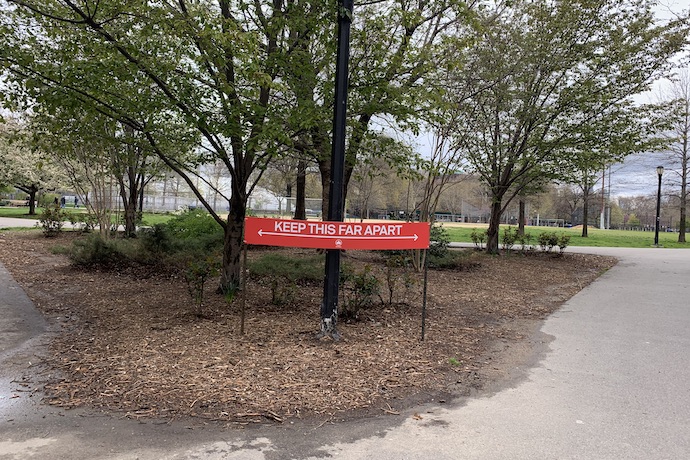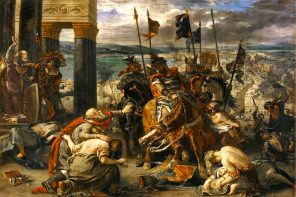Readers will know that we at Religion Dispatches hold no special brief for faith or no faith, or any particular brand of religion. We have invested many years and much of ourselves, dear God so much of ourselves, into a phenomenological approach: sometimes religion is a net positive. Sometimes it is not. Much of the time, it’s a confusing muddle. We try to look at it from many different angles, not to praise it or kill it, but mostly just to observe it for what is and how it is lived, whether good, bad, or weird.
Ordinarily, we would not ask you to judge between two competing religious practices. I certainly have no interest in weighing in on Protestant Christianity vs. Catholicism, much less Theravada vs. Zen Buddhism.
But let’s talk for a minute about the consequences of two schools of thought. In this case, it’s not different sects of a fully developed theistic faith: it’s different ways of living the American civil religion. The concept is of course from Rousseau (we’ll come back to him), but in the American context, it’s been developed most thoroughly by Robert Bellah, who says “from the earliest years of the republic is a collection of beliefs, symbols, and rituals with respect to sacred things and institutionalized in a collectivity.”
As Bellah and others have argued, civil religion has never been quite the same as generalized Christianity in America, even though Christianity has dominated the nation from the get-go, and even though the civil faith has carefully maintained a respectful deference to it. Likewise, though civil religion is often concerned with the history and governmental aspects of the nation, it would be too easy to reduce it to simple worship of the flag or the Commander-in-Chief, no matter how the current Juche president wishes it were otherwise. It’s a slippery concept to define, but a good practical definition of civil religion might be that it’s an attempt to find meaning and value in the practice of civic life, broadly defined.
Now that we have that definition, I ask you which of the following examples of civil religion would you prefer in the time of coronavirus?
Would you like the erratic worship of “freedom” and “strength” pushed by Pres. Trump, who can’t seem to decide if COVID-19 is a threat or defeated, or if he just needs to cover his ass? The religion that’s fired by know-nothing cultists astroturfed into a frenzy of defending Trump’s economy, and by extension his re-election? That’s content to allow “blue states” to go bankrupt, and more than a little happy to use the crisis as a convenient excuse to crack down on immigration, which then turns into a convenient way of distracting from the high priest’s failure to keep his followers safe?
The beliefs of this form of civil religion seem to amount to “Pres. Trump can do no wrong” and “Screw the weak, I want a haircut.” The symbols run to swastikas, Confederate flags and automatic rifles, and the central rituals consist of praising the president for his leadership and that same president attempting to divide Americans against one another, most recently by suggesting that Muslims would be allowed to gather for Ramadan while Christians were banned from celebrating Easter.
Or would you prefer the kind of civil religion adhered to by the strong majority of Americans, which believes that it’s better to be safely stuck and bored of Netflix at home than to kill sick, elderly, or otherwise vulnerable neighbors? The one where only 8% reported their house of worship being open over the Easter weekend, and only 5% planned to attend, even where it was allowed? The one in which neighbors drop off hand-sewn masks, as ours did the other day?
The one whose symbols are hearts and rainbows in windows, and whose rituals are mostly waves and laughs from a distance while walking the dog, or stale jokes about the tedium of Zoom meetings? David M. Perry makes a serious case that social distancing is “today’s greatest act of patriotic love,” and he’s not wrong. You would have to go all the way back to Liberty Bond rallies and victory gardens to find a time when Americans were more united in civic duty.
This isn’t a fair fight—of course it isn’t—and I haven’t presented it as such. Very few readers would be more inclined to Trump-style defiance of any limits imposed in the name of public health. My point is simply to say again that beliefs have consequences. In this case, the consequences of a particular form of civil religion might be to lift the COVID-19 death count from tens of thousands to hundreds of thousands. Had the non-believers of that faith within the administration, like Anthony Fauci, not prevailed, we might be looking at the deaths of millions.
According to Bellah, when Rousseau defined civil religion, he outlined “simple dogmas of the civil religion: the existence of God, the life to come, the reward of virtue and the punishment of vice, and the exclusion of religious intolerance.” It’s the last two that we should be most concerned with here. So far, it seems to be mostly the innocent who are punished for the civil religion of others, but I’m Calvinist enough to think that the protestors screaming to reopen the economy will face their own form of judgment, whether on a ventilator or before an all-seeing God. I especially hope and believe that will be the case for a President incapable of leading a response to the crisis; incapable really of making anything about more than his own ratings. Rousseau had that faith, too. It drove the mobs of the French Revolution.
It doesn’t take much of a prophet to see that the Trumpist civil religion—so intolerant of anyone who would disagree, so contemptuous of the health, safety, or flourishing of others—cannot last long before the arrival of the fire next time. American partisan conflict has nothing on the sectarian battles of Europe, but it’s getting old, and people are dying as a direct result. Like I said, beliefs have consequences. In that, civil is no different than any other religion.





